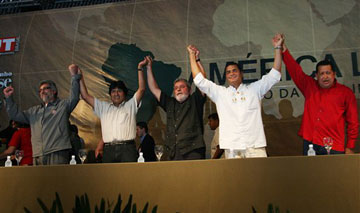A Tale of Two Forums
Last week the World Financial Forum was held in Davos, Switzerland, and the World Social Forum was held in Benem, Brazil.
As expected, both forums are the opposite of each other, not only in the setting - the snowy Swiss setting stands in stark contrast with the humid, Amazonian setting of Belem - but in ideology as well.
The Latin American presidents attending Davos, Álvaro Uribe of Colombia and Felipe Calderón of Mexico, took the opportunity to promote their countries at the World Financial Forum. Both Uribe and Calderon lead countries that are fighting drug wars, and which are striving to diversify their economies by attracting foreign investors. Davos is the perfect setting for that. Additionally, policymakers from around the world meet there to exchange ideas, which, like it or not, affect the smaller countries' economies. It behooves the leaders of growing economies like Colombia and Mexico to be there, even in a year when the WFF was decidedly somber.
Both Uribe and Calderón highlighted their countries' aggressively implemented reforms that have significantly boosted foreign investment. Both Uribe and Calderón realize that their countries' economic future lies in world trade.
For the first time in three years, Brazil's President Luiz Inacio Lula da Silva opted to attend the World Social Forum. Brazil spent $35 million in hosting the event, which was titled "Another World Is Possible," and because of its location near the mouth of the Amazon River had an ecological theme, in addition to the anti-globalization theme on which it was founded in 2001.

Paraguay's Fernando Lugo, Bolivia's Evo Morales, Ecuador's Rafael Correa, and Venezuela's Hugo Chavez joined Lula in a panel, "Dialogue on popular integration in our America," an anti-globalization discussion. The intentionally placed word "our," included in the title of the most publicized panel of the event, is a subtle reminder that this event is a public-relations junket for the world's Left. Chavez, as usual, vied for attention over Lula, the host.
The economies of Paraguay, Bolivia, Ecuador and Venezuela combined do not match the size of the Brazilian economy. Of course the forum provided them the opportunity to berate the US.
Lula, as head of the world's tenth largest economy, might have wanted to give a symbolic "slap at the bankers" and score points with his base constituency at home and with fellow Latin American socialists. However, his absence at Davos was a missed opportunity, in the words of Nick Chamie, global head of emerging-markets research at RBC Capital Markets,
to raise the profile of Brazil and its companies as they seek to refinance $64 billion in maturing foreign debt this year.The end of the commodity boom adds more strain on the Brazilian economy which has come to a standstill.
In a nervous world financial environment, Lula's shunning of Davos was not a wise move.
Fausta Wertz also blogs at Fausta's Blog



